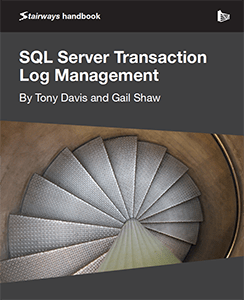In this free eBook Shawn McGehee offers advice on query tuning, cutting stored procedures, and system process design and implementation for high availability. Discover how to perform backup and restore operations using SQL Server Management Studio (SSMS), basic T-SQL scripts and Redgate's SQL Backup tool.
2020-12-02 (first published: 2014-03-05)
80,501 reads
Resilient T-SQL code is code that is designed to last, and to be safely reused by others. The goal of defensive database programming, the goal of this book, is to help you to produce resilient T-SQL code that robustly and gracefully handles cases of unintended use, and is resilient to common changes to the database environment.
2020-11-25 (first published: 2013-08-28)
105,836 reads
When you can’t get to your data because another application has it locked, a thorough knowledge of SQL Server concurrency will give you the confidence to decide what to do.
2020-11-11 (first published: 2013-07-17)
106,148 reads
Three SQL Server MVPs (Jonathan Kehayias, Ted Krueger and Gail Shaw) provide fascinating insight into the most common SQL Server problems, why they occur, and how they can be diagnosed using tools such as Performance Monitor, Dynamic Management Views and server-side tracing. The focus is on practical solutions for removing root causes of these problems, rather than "papering over the cracks".
2020-11-04 (first published: 2013-08-07)
103,660 reads
When a SQL Server database is operating smoothly and performing well, there is no need to be particularly aware of the transaction log, beyond ensuring that every database has an appropriate backup regime and restore plan in place. When things go wrong, however, a DBA's reputation depends on a deeper understanding of the transaction log, both what it does, and how it works.
2020-10-28 (first published: 2013-08-14)
104,952 reads
Now in it’s 4th year, the State of Database DevOps report continues to deliver valuable insights. In the report, you will learn multiple tactics to improve the quality of database code deployment, whether it is by changing the type of environment used for development, enhancing your code review practices, or your change management/approval practices.
2020-02-28 (first published: 2020-02-10)
PASS Summit is the must-attend conference for Microsoft data professionals; delivering 3 full days of technical training on data architecture, management, and analytics. Get the skills you need with in-depth sessions created and led by industry experts. Network and problem-solve with peers and Microsoft engineers, and get ahead of the curve with spotlight sessions on today’s hot topics. Join Redgate and the PASS community in Houston on November 10 - 13 to future-proof your data career.
2020-02-21 (first published: 2020-01-28)
Join Redgate’s Arneh Eskandari and BMW’s Tony Maddonna for a free webinar on Nov 20: How to make your 2020 monitoring strategy a success. Learn how to prepare for successful estate growth, expected trends for the year, and the role monitoring plays in engabling growth and stability in your organization.
2019-11-18 (first published: 2019-11-08)


